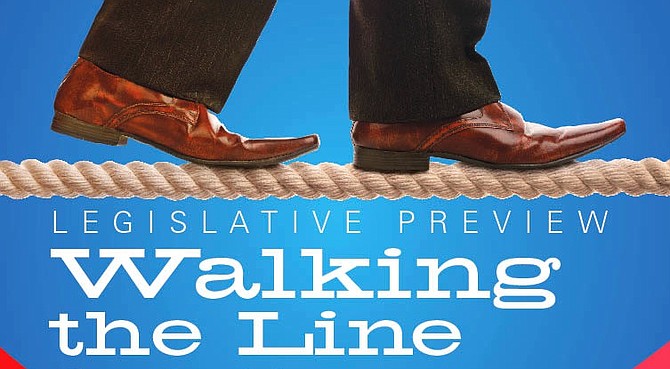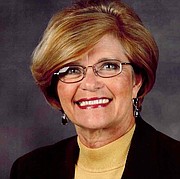Officials and advocates don't expect this legislative session to be much different than any other. It's a state-wide election year, which is the perfect time for emphasizing wedge issues and lollygagging on real state concerns like education and Medicaid.
Really, the session could go either way. It could be as mundane as some of the weary progressive-cause advocates think it will be, or the anticipation of the November elections could create tension on hot-button issues.
Ultimately, the constituencies of each party have stayed the same. On education and Medicaid, opposing anything associated with President Obama resonates with the Republican base, which could result in the attempted destruction of Common Core education standards and the refusal of Medicaid expansion.
The Democratic base, on the other hand, wants expansion of Medicaid and the full funding of the Mississippi Adequate Education Program—two perennial fights that the minority party tends to lose in the Capitol.
Yet, one issue may draw support from both parties. The accusations of voter fraud and irregularities in the June runoff for the U.S. Senate Republican primary appears to have created consensus that it is time to rethink how campaigns are regulated in the state.
A Bipartisan Response?
Everything from early voting to Saturday voting and online registration are sure to be brought up this session with the help of a legislator who has been working on election reform for years, Rep. David Blount, D-Jackson.
Blount, who previously worked directly with elections as the communication director in former Secretary of State Eric Clark's office, wants reforms that increase voter turnout and make it easier for Mississippians to vote.
Secretary of State Delbert Hosemann, a Republican who prides himself on bringing voter ID to the state, set up a task force to study the problems revealed by the primary between establishment Republican U.S. Sen. Thad Cochran and Tea Party State Sen. Chris McDaniel of Laurel. The task force discussed its support of the kind of reform that Blount has been working on for years, including early voting and online registration, in a study group in September.
These ideas aren't necessarily linked to the problems in the Cochran-McDaniel race. "They're just two good ideas," Blount said. "That was a Republican primary so that electorate is not representative of the state as a whole."
Blount and many Democrats also are concerned with how people regain their right to vote after having it revoked. After a person convicted of a felony "pays his debt to society," as progressive lobbyist Rims Barber put it, Mississippi "makes it very difficult for anybody to get their voting rights reinstated once they've lost it."
The Legislature must pass a bill with the person's name on it for him or her to get back the right to vote. Blount wants to introduce legislation to make the process easier.
One question that came out of the mess of a Senate race last year was whether or not Mississippi's primaries should be closed, due to the McDaniel campaign's complaints about voting across party lines. Blount said, however, that the current primary system is fine and that he doesn't support anything—like closed primaries—that would restrict voting for some people.
Sen. McDaniel is an obvious supporter of reform to party primaries. In a Dec. 31 email to the JFP, McDaniel wrote, "(W)e must reform the primary process, ending forever the unconstitutional and improper practice of party-raiding. Republicans should be able to select their nominees without outside interference from Democrats. Likewise, Democrats must be afforded that same right."
McDaniel cites the 40,000 Democrats that he claims voted in the GOP primary in June 2014 for his reasoning. Along with a proposal to close party primaries, McDaniel also plans to propose reducing the size of the state Legislature to lower costs and imposing term limits on state legislators.
"People should not make a career out of politics," McDaniel said in the Dec. 31 email.
Reading, Writing and Reelection
The only two times that the Mississippi Adequate Education Program—which is always a major point of contention—has been fully funded since its creation in 1997 was in federal and state election years, 2007 and 2008, respectively.
Lt. Gov. Tate Reeves said he plans to help increase education funding beyond previous years. "My goal for next year's budget is to have appropriated more money for Mississippi's public education than ever before in the history of our state," Reeves told reporters at a John C. Stennis Capitol press luncheon in late November.
But the state has adamantly refused to fund the program they had determined was needed for each public school to reach at least a "C" rating. So Democratic leaders and public-school advocates have torn down statements like Reeve's and stated what they believe is the reality: The leaders are unwilling to invest in public schools.
The Joint Legislative Budget Committee's budget proposal for fiscal year 2016 has already created a tizzy, prompting Democratic leaders to urge Republicans to "put your money where your mouth is."
Hank Bounds, Mississippi's commissioner of higher education, says that greater education attainment is a primary driver of economic development and something Mississippi needs if it wants to catch up with the rest of the nation.
He also recognizes the resources required to get there.
"I understand all the arguments. I recognize we are not a resource-rich state. I recognize that there are limited dollars available," Bounds said at a John C. Stennis Capitol press luncheon early November.
"The problem is, if we don't get really focused on dealing with the education issue, (kindergarten) through universities, then someone else will be standing here in front of a group just like this 10 years from now, with the types of questions being asked, and folks asking 'Why aren't we making more headway in education?'"
Interestingly, especially after Reeves' statements, the Joint Legislative Budget Committee's budget proposal cuts $3 million from Community Colleges and $19 million from Universities and continues to underfund MAEP by almost $300 million. Gov. Bryant touted the increases in education by $52 million in his budget proposal. However, his proposal shorted MAEP by $260 million.
Rep. Bobby Moak, D-Bogue Chitto, says state leaders are able to give the impression that they are increasing education funding while not actually providing any additional resources to the classroom.
"Even the governor likes to say, 'Well I'm putting an additional $52 (million) or $58 (million)'—his number sort of changes, 'into MAEP.' But what (Bryant) doesn't tell you is that $41 million of that is just to cover the teacher pay raise, so he's actually not putting anything additionally into MAEP other than a few million bucks," Moak said.
Rep. John Moore, R-Brandon, chairman of the House Education Committee, echoed Reeves' statements, saying that the Legislature will fund education greater than ever before by looking at increasing the amount of money teachers receive for supplies and focused programs like the third-grade reading gate and the pre-kindergarten program. Still, he said, full funding of MAEP is likely unreasonable.
"Anybody with any reasonable sense knows that we don't have the money to fully funded it and do it consistently, and there's no use in fully funding it one year and then having to back up next year," Moore said in an interview.
Sen. Joey Fillingane, R-Sumrall, chairman of the Senate Finance Committee, also disagrees with Moak, saying that education gets its deserved piece of the pie at 60-62 percent of the budget.
Moak, however, suggests that the state prioritizes giving tax breaks to businesses over funding education.
"Here's what you don't tell people: When you give tax credits, when you give money away in the form of grants, that's not in the budget, those are items that have either been taking out of the budget or they're off budget. So when you add all of those things in there, you're underfunding education by a long way," Moak said.
Fillingane said that giving tax credits to lure businesses to the state is not like giving away money in the state budget because, if it were not for the tax incentive, that money wouldn't be coming to the state anyway. "So I don't buy their argument at all," Fillingane said.
To get back to the full funding of MAEP, Democratic leaders have proposed allocating $97 million more for MAEP this year and the following two years, closing the current gap in funding over the next three years. This is a reasonable goal, they believe, because of increasing revenue.
Mississippi Commission on the Status of Women Chairwoman Gloria Williamson, a former state senator, said pushing for education funding will be one of her priorities this legislative session, because education quality in the state affects everyone.
"We have the money, and I don't understand why we wouldn't want to do that," Williamson said. "If we want better jobs in Mississippi, and we want better pay, and we want equal pay for everyone, we need to push for education," Williamson said.
Bypassing the Legislature
Better Schools Better Jobs, a public-school advocacy nonprofit, is combatting the state's chronic underfunding of public schools with a proposed amendment to the state constitution that would mandate the state to provide "an adequate and efficient system of free public schools."
"I would be surprised if (the leadership) just bought it hook, line and sinker," allowing the initiative without a fight, political analyst Marty Wiseman said.
Right now, the constitution only requires the state to fund free public schools "upon such conditions and limitations as the Legislature may prescribe."
Patsy Brumfield, a former journalist and now a Better Schools Better Jobs organizer, calls that last part the "if-you-feel-like-it clause."
Now that the initiative has received enough signatures—over 120,000—to get on the ballot in November 2015, Brumfield's main task is making sure legislators don't add an alternative amendment to the ballot to confuse voters.
Mississippi's initiative process, dictated in a law more than 20 years old, allows legislators to add a revised amendment next to any initiative that has made it onto the ballot. While the Legislature has never used this ability under the law, Moore said the leadership is discussing its intent to do so with this amendment.
Moore said the wording of the amendment by Better Schools Better Jobs is deceptive and. Simply asking "should the State be required to provide for the support of an adequate and efficient system of free public schools?" does not tell voters what the amendment actually is, he said.
"That question that's on the ballot in no way reflects what people will be voting on," Moore said.
For this reason Moore said the state could provide an additional amendment that would make it clear what the constitutional amendment would do—which, in Moore's opinion, is give a judge the power to determine how the state should fund education.
Brumfield said the Legislature might try to make the ballot less clear with the alternative amendment with hopes of deterring votes from the Better School initiative so it won't pass. Her group, as well as the League of Women Voters in Jackson, will communicate with legislators to urge them not to pass the alternative amendment.
Fran Leber, vice president of administration for the League of Women Voters in Jackson, said the alternative amendment "will make it confusing to people and which one they should vote for."
Setting Up Failure?
The concerns about underfunding are not restricted to the MAEP formula, but also over other programs the state has adopted. The state has not given enough money to the so-called "third-grade reading gate"—which keeps children back in third grade if they are not reading at grade-level—for it to work.
Public-school advocates suggest that the gross underfunding makes it impossible for schools to hire literacy coaches.
Rims Barber, who is also a civil-rights veteran, said he believes the lack of funding creates a system where kids don't receive the help they need to succeed and then are held back when they don't.
"Pretty soon we're going to have the toughest third-grade basketball team in the nation," Barber said, referring to the increased number of children who will be held back due to the reading gate because they aren't given the resources to meet reading standards.
Instead of providing resources to schools, some Republicans have prioritized getting rid of Common Core—the newest set of standardized education standards—during this legislative session.
McDaniel told the JFP he plans to introduce a bill to repeal Common Core.
Reeves said at the Stennis forum in November that he will do what he can to avoid what he calls a "government hijacking" of education standards.
Barber said the Republican objection to Common Core, which is a set of high standards with an emphasis on critical thinking, makes little sense.
"I have yet to figure out, on the Common Core issue, what are they objecting to? Are there words that people would learn to read that they don't want kids to learn how to read?" Barber said. "If we use the same set that other states are using, gee, that makes some sense."
Reeves has proposed a task force—made up of parents, educators and specialists that he and the governor appoint—that would create new standards for the state's schoolkids. But some lawmakers don't believe these decisions should be in the hands of politicians or the state leadership.
"The decision on all this Common Core, and the PARCC (Partnership for Assessment of Readiness for College and Careers) and all that, that needs to be made by the state Board of Education. It does not need to be made by the governor, lieutenant governor or the Legislature. We need to get the politics out of it," Rep. Cecil Brown, D-Jackson, said.
Rep. Moore thinks similarly. "I'm of the opinion that we need to let the state Department of Education deal with that. They are the experts," Moore said. "As far as taking the entire standards package and throwing it out, that's something we cannot do—put our school districts in a pandemonium out there."
Brown is concerned about legislators, whom he points out are not educators, wanting to do away with a system about which they "don't have any clue what they're talking about."
"I haven't heard one of them say they read Common Core," Brown said. Barber agrees, saying the Common Core issue is a manufactured crisis: "It's all politics."
The Common Core outcry originates from a situation in Oklahoma, in which Reeves said the federal government forcefully imposed its school standards on the state by revoking its standards waiver.
Reeves points out that the Mississippi Legislature was the group that granted the Mississippi State Board of Education the authority to dictate school standards years ago, so either the board or the Legislature could implement standards the proposed task force develops.
"I think it is important that we have input on these standards from not just a group of people that are appointed. We also need input from parents, we need input from teachers, we need input from administrators, we need input from subject matter experts," Reeves said at the luncheon in November.
After Reeves' talk, MDE released a statement expressing the importance of sticking with the high set of standards that schools are currently held to under Common Core. The board's statement also corrected the misconception that the federal government took away Oklahoma's flexibility waiver. Instead, when the state struck down Common Core, it had no standards in place, which prompted the federal government to step in because it is mandatory for states to have a set of school standards.
'School Choice' on Deck
The Legislature will likely address the potentially politically driven topic of "school choice" this session as well. Legislators plan to revisit the special-education savings account bill, which gives scholarships to special-needs students for them to leave public school if they wish, that was unsuccessful in the House last year.
Rep. Carolyn Crawford, R-Pass Christian, a former social worker, authored the Equal Opportunity for All Students with Special Needs Act in the House last year and plans to work on similar legislation this session. As a mother of a special-needs child, she says the Legislature's refusal to enact "school choice" policies for students with disabilities shows a disregard for those students and a fear of "school choice."
"I do take it as a slap in the face to our children with disabilities that the state of Mississippi doesn't care whether they get a free and appropriate education that meets their needs ... that we're not supporting educational success in whatever avenue that best meets these children's needs for political reasons," Crawford said.
Crawford said she believed there was some misconceptions about the bill, emphasizing that the program would not take any money out of MAEP but would be funded through the general budget.
"This is putting more money into education as a whole," Crawford said. "This was a separate line item."
Public-school advocates respond that because the money is being spent on education, it could be funneled into MAEP where it would serve all children in public schools in the state, not just special-needs students.
Supporters of the bill argue that special-needs students in the state are especially suffering. "The Equal Opportunity Special Needs bill is the top of our priority list," said Grant Callen, founder of Empower Mississippi, which pushed for the bill last year.
Special-needs students who qualify under the Individuals with Disabilities Education Act (IDEA) have a graduation rate of only 23 percent in Mississippi.
"The problem they identify is very real," Barber said.
"The question is whether this is the right solution or not. ... I am leery of the people who seem to be pushing it because they are the people who have been anti-public schools on a lot of other issues."
Equal-Pay Fight Ahead
Gloria Williamson, the women's advocate and former state senator, said legislation for closing the wage gap will be critical this session.
Rep. Brown said he "and every other Democrat in the Legislature" is in favor of making sure women receive equal pay for equal work. He thinks of his daughters and granddaughters and doesn't understand why anyone would be against ensuring pay equality for women.
"I don't know what the argument is against it," Brown said. Brown thinks equal pay will be the "kicker."
Pay-equality legislation has not been successful in past years with all wage-gap bills dying in committee last year. Both the Evelyn Gandy Fair Pay Act authored by Rep. David Baria, D-Bay St. Louis, and the Fair Pay Act of 2014 authored by James Evans, D-Jackson, died in committees chaired by Republicans.
Williamson said three fair-pay bills have already been pre-filed for the 2015 session and have small differences. "One of them has lots of guts to it; the other ones are milder," Williamson said.
The House and Senate leadership decides which committee gets each bill, so the fact that last year's wage-gap bill went to a Republican-chaired committee, and not to the committee chaired by Sen. Hob Bryan, D-Amory, tells Williamson they didn't want the issue discussed.
"If the lieutenant governor and the governor and the speaker of the House wanted it out, it'd come out. So where does the buck stop? At the top," William, a former senator, said.
Illustrating the lack of discussion on the issue, Sen. Fillingane says he has never seen equal-pay legislation addressed in the Legislature, so he doesn't know what the opposing argument would be. "I didn't know they existed," Fillingane said.
Williamson also wants legislation to help fight human trafficking, especially to address the way predators use social media to lure girls.
Because Mississippi Republicans are so notorious for their attempts at legislation restricting women's reproductive rights, most people believe something regarding women's uteri will come up.
"Every year there's something," Barber said. But after the 20-week abortion ban of last year and the passage of laws aimed at closing the last abortion clinic in the state—which were unsuccessful, it's hard to anticipate what more the state could do.
"We've about done everything we can to restrict that at this point," Brown said. "I don't know what they can do anymore."
Medicaid Fight Returns
The same circumvention of discussion on equal pay is happening with Medicaid expansion, which can be blamed for the state's high medically uninsured rate.
Rep. Steve Holland, D-Plantersville, said he believes the conversation about Medicaid expansion will be the same as in recent years. "Which is absolutely zip, none," said Holland, who chaired the Public Health and Human Services Committee in the House for 28 years. Since Republicans took the House in 2011, it has been chaired by Rep. Sam Mims, R-McComb.
"Current leadership does not even allow one official legal hearing on that subject in three years," Holland said, referring to the many bills that died in committee. Democrats in the Legislature have forced several debates through floor amendments, but the leadership has not been engaged.
Six bills proposing expansion of Medicaid under the Affordable Care Act went to the House Medicaid committee, chaired by Rep. Bobby Howell, R-Kilmichael, in the 2014 session. All of them died there.
The Medicaid bills in the Senate went to other committees, like the Senate Public Health and Welfare Committee or Senate Finance Committees, both chaired by Republicans. They died without discussion.
In June 2013 NPR reported that Speaker of the House Philip Gunn, a Republican from Clinton, didn't allow a debate on Medicaid expansion because he "saw it as a waste of time."
"I am dealing with reality," he told NPR. "The reality is that an expansion bill is not going to pass the House of Representatives. I think (the Democrats) are playing politics, and we are dealing with reality."
This is unconscionable to Holland, who is often in contact with Mississippians who are "trying, begging for some kind of health care and they can't get it. Medicaid expansion would have given it to them."
Giving Money Away?
Mississippi hospitals say they're in danger. Many of the rural ones are going bankrupt because of state and federal cuts to reimbursement. The idea was that the Affordable Care Act would insure more citizens, thus creating more patients paying into the system for hospitals to make up for the cuts.
But since Mississippi hasn't expanded Medicaid under the ACA for economically disadvantaged people in the state, hospitals are getting the brunt of the politically divisive issue, along with the 20 percent of Mississippians still uninsured.
ACA, which was passed in 2010, pays for 100 percent of the Medicaid expansion for the first three years and 90 percent thereafter until 2022.
Since the expansion would cost the state next to nothing, the leadership's refusal to provide insurance to its citizens likely comes down to an ideological conflict with President Barack Obama's administration. But Mississippi has already missed out on $2 billion in federal matching dollars. And as people like Williamson point out, "Somebody's going to get the money, you can count on that."
Even southern states with Republican governors are getting on board with Medicaid expansion through the ACA—such as Tennessee and Alabama recently. "I think the fact that we have three more Republican governors, that will make a total of 14 Republican governors ... says something to Republican voters, Republican members of the Legislature," Brown said.
"Maybe we ought to do the same thing. We can't even get a debate on it."
On Dec. 15, Tennessee Gov. Bill Haslam proposed a plan to expand health-care access, but not in the traditional sense.
"We made the decision in Tennessee nearly two years ago not to expand traditional Medicaid," Haslam said, reported by The Tennessean newspaper. "This is an alternative approach that forges a different path and is a unique Tennessee solution."
"The governor in Tennessee went out of his way to say this wasn't a Medicaid expansion or expanding the Affordable Care Act; this is the Tennessee plan," said Jarvis Dortch, communications coordinator for the Mississippi Health Advocacy Program. "From our point of view, we just want to make sure people have health insurance."
The Obama administration is being lenient with these states, giving exceptions to those who want to come up with an alternative to traditional Medicaid expansion, but still use federal dollars. With the federal waiver, which Tennessee still needs to receive, the government is allowing states to take the funds through ACA and use them for private insurance providers.
Instead of those insured citizens enrolling in state-based plans, the state would assist them with premium assistance or tax credits to help fund private insurance plans.
"That's something that I think would probably work in the state of Mississippi," Dortch said. "We're hoping ... that we basically take our head out of the sand and actually start thinking about solving some of these problems."
Dortch said it would be simpler for the state to expand the existing Medicaid system, but if the alternative route can decrease the uninsured rate in Mississippi, that's what matters.
"It's something ugly," Holland said, that keeps the Mississippi leadership from helping get hundreds of thousands of state citizens insured.
"Politics gets in the way of things," Dortch said.
Correcting Corrections
With its perennial budget woes, reforms at the Mississippi Department of Corrections are always on the table.
This time around, MDOC is no longer fighting a budget deficit, but the state's prison system will again be in the spotlight in the wake of the recent indictment of Christopher Epps, MDOC's longtime commissioner, and Cecil McCrory, a businessman and prison-industry consultant, on 49 federal corruption charges related to no-bid contracts to various firms with which McCrory had business.
Epps and McCrory had faced January trials before U.S. District Judge Henry Wingate, but those are likely to be put off until after the legislative session ends.
In the meantime, Gov. Phil Bryant named a replacement for Epps in Marshall L. Fisher, who formerly headed Mississippi's Drug Enforcement Administration office. Bryant also convened a task force to overhaul the awarding of MDOC contracts. Just before the end of the year, the task force released a preliminary set of recommendations.
The five-person task force said the state should bid out all contracts regardless of its size and eliminate existing no-bid contracts more than six months old and implement a competitive bidding process for those contracts. The report also calls for increased transparency requirements, such as naming any consultants as well as identifying the names of owners and individuals with more than a 5 percent interest in the vendor's business.
House Corrections Committee Chairman Rep. Tommy Taylor, R-Boyle, said he expects some of the legislation that emerges from the task force to come through his committee. Additionally, Taylor, a former warden, wants to revive a bill that died on the calendar last year to require auditing of county jails adjoining regional correctional centers.
Taylor also plans to introduce a bill that would permit deer hunters to donate venison to state prisons, which he believes would provide a source of low-fat high-protein meat as well as help keep the state's deer population in check.
Small, But Notable
As always, Mississippi lawmakers are working on their own, smaller projects for this legislative session.
Brown wants to get rid of the inspection-sticker requirement for vehicle owners. To him, the requirement is just an extra cost and a nuisance.
Rep. Chuck Espy, D-Clarksdale, announced his intent to propose legislation requiring police officers to wear body cameras while on duty. The proposal came after the non-indictment in two national cases of police killing.
"The public has increasingly lost confidence in our policing and judicial systems," Espy stated in a press release.
Espy is also working with the founder of Jackson-based Fast Forward, Tim Mask, to propose legislation that gives incentives to recent graduates to stay and find work in the state.
The initiative would, in theory, give a 100 percent income tax credit for up to five years to individuals who take a "qualifying job"—one that requires the degree the individual has.
Sen. Fillingane hasn't heard of legislation geared at tackling the "brain drain" yet, but he anticipates that the Finance Committee will be involved in studying the language if it is introduced this year.
Because 2015 is an election year, there's bound to be a number of wacky bills proposed. "Those hot-button issues will have lots of bills introduced," Barber said.
District Court Judge Carlton Reeves struck down the state's gay-marriage ban, Barber anticipates that a legislator will try to introduce discussion about protection traditional marriage. Not much can be done now, he recognizes, until the 5th U.S. Circuit Court of Appeals rules.
"I assume someone will want to vent about it anyway," Barber said.
Fillingane agrees that many bills on hot-button issues will be filed, but because it's an election year, "you probably won't see a full debate on a lot of those," he said.
"Everyone is focusing reelection and not focusing on big major policy changes, and that may be somewhat different this year just because some these issues like ... the Affordable Healthcare Act and the MAEP funding battle ... they're sort of required to be looked at this year because of outside forces," Fillingane said.
Ultimately, the red-meat bills, including ones to restrict a woman's right to receive abortions, won't be substantive.
"This legislative session I don't know that you'll see, because it's an election year. ... They'll pass something, I'm sorry, but not very meaningful," Williamson said.
R.L. Nave contributed to this story.







Comments
Use the comment form below to begin a discussion about this content.
comments powered by Disqus